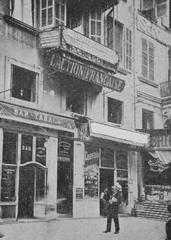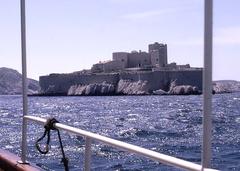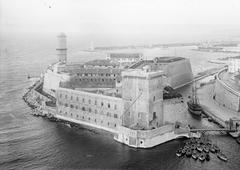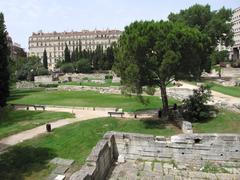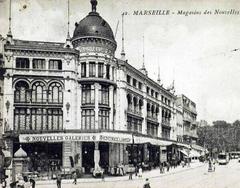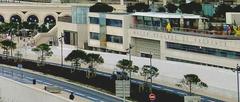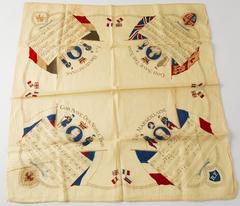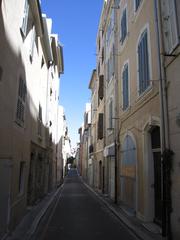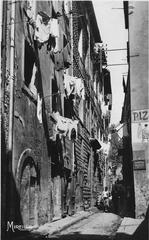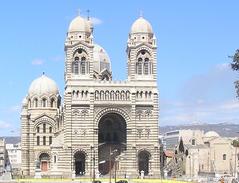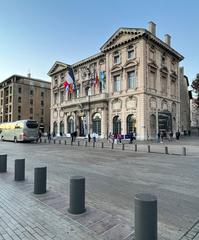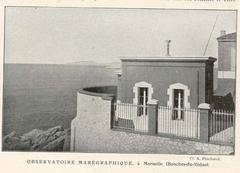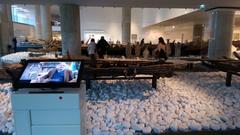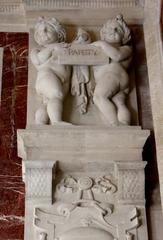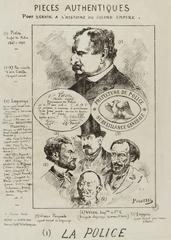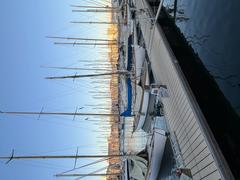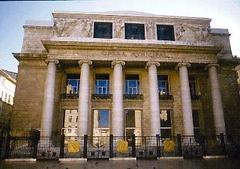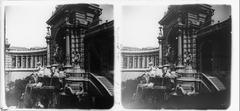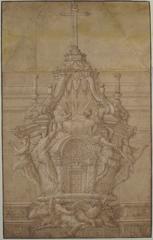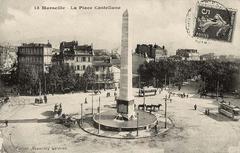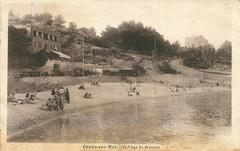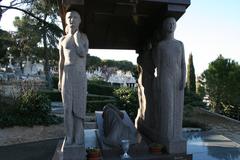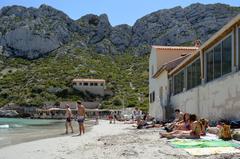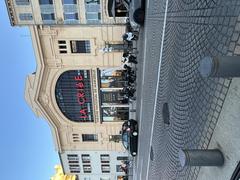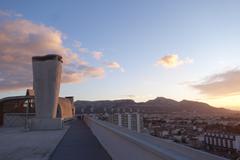Marseille History Museum: Comprehensive Visitor Guide (2025)
Date: 15/06/2025
Introduction
The Marseille History Museum (Musée d’Histoire de Marseille) is an essential destination for anyone interested in the rich, multifaceted history of France’s oldest city. This guide provides up-to-date information on visiting hours, ticketing, accessibility, must-see collections, and nearby historical sites, ensuring you make the most of your trip to this unique museum. Whether you are a dedicated history enthusiast, a family, or a casual traveler, the museum offers an immersive journey through 2,600 years of urban and maritime history (Marseille History Museum - Marseille Tourisme; Tripomatic; Nomads Travel Guide).
Table of Contents
- Introduction
- Historical Background and Significance
- Key Collections and Highlights
- Visiting Information
- Special and Temporary Exhibitions
- Nearby Attractions & Suggested Itineraries
- FAQs
- Conclusion
- References
Historical Background and Significance
Archaeological Discovery and the Museum’s Origins
The museum’s story began in 1967, when construction of the Centre Bourse shopping complex near the Vieux-Port led to the discovery of extensive remains of the ancient Greek and Roman port of Massalia. Archaeologists uncovered ramparts, necropolises, and port structures, prompting city officials to preserve the site and create a museum integrated with the archaeological park, known as the Jardin des Vestiges (Wikipedia; History Tools). The museum opened in 1983, pioneering the presentation of urban history in France (Marseille Tourisme).
Marseille: France’s Oldest City
Founded by Greek settlers from Phocaea around 600 BCE, Marseille—originally Massalia—quickly rose as a prominent trading port in the Mediterranean. Its strategic location at the mouth of the Rhône River fostered centuries of commerce and cultural exchange, with each era—Greek, Roman, early Christian, medieval, and modern—leaving its mark on the city (Visit Places France; Provence-Alpes-Côte d’Azur).
Museum Evolution and Renovations
After its debut, the museum underwent a major renovation, reopening in 2013 to mark Marseille’s tenure as European Capital of Culture. The revamped museum blends ancient remains with contemporary architecture and state-of-the-art exhibitions, offering 3,500 square meters of permanent galleries, a temporary exhibition hall, a documentation center, and an auditorium (Provence-Alpes-Côte d’Azur).
Key Collections and Highlights
Jardin des Vestiges
The Jardin des Vestiges is an outdoor archaeological park directly adjacent to the museum. Visitors can walk among the remains of ancient Greek and Roman ramparts, quays, warehouses, and a necropolis—offering a rare, in situ glimpse into Marseille’s origins (History Tools).
Ancient Shipwrecks and Maritime Heritage
The museum holds one of the world’s largest collections of ancient ship hulls, dating from the 6th century BCE to the Roman era, highlighting Marseille’s enduring role as a maritime center (Marseille Tourisme).
Early Christian Artifacts & Cosquer Cave
Artifacts from early Christian Marseille—including parts of the 5th-century Malaval church and objects related to the production of holy oil—underscore the city’s spiritual history. The museum also features detailed replicas and information about the Cosquer Cave, whose Paleolithic art demonstrates human presence over 27,000 years ago (Marseille Tourisme).
Interactive and Multimedia Exhibits
Across thirteen chronological sections, the museum employs over 100 multimedia installations, interactive displays, augmented reality, and thematic models to make history accessible and engaging for all ages (History Tools; The Crazy Tourist).
Visiting Information
Hours, Tickets, and Free Entry
-
Opening Hours:
- Tuesday to Sunday: 9:00 or 10:00 AM – 6:00 PM (verify on official website)
- Closed Mondays and select public holidays
-
Tickets and Admission:
- Permanent Collections: Entry is free for all visitors as of 2025 (WhichMuseum).
- Temporary Exhibitions: May require a ticket; prices and details on the museum’s site.
- Free Entry Days: First Sunday of each month and during European Heritage Days (GoBackpacking).
Accessibility & Facilities
- Fully wheelchair accessible (elevators, ramps, adapted restrooms)
- Lockers, accessible restrooms, baby-changing facilities
- Free Wi-Fi and cloakroom
- Gift shop with books and local crafts
- Auditorium, documentation center, and family-friendly features
Guided Tours and Family Activities
- Regular guided tours in French; English tours or audio guides may be available on request (France Voyage).
- Workshops and interactive learning stations for children (“History’s Ports of Call”)
- Contact the museum in advance for group/school bookings
Tips for a Great Visit
- Allocate 2–3 hours to explore both the museum and Jardin des Vestiges
- Weekday mornings are quieter; weekends and school holidays are busiest
- The museum is air-conditioned—ideal for summer visits
Photography and Visitor Conduct
- Non-flash photography is generally permitted in permanent galleries
- Restrictions may apply during temporary exhibitions; always check signage
- Food is not allowed in galleries; refreshments available at Centre Bourse
Special and Temporary Exhibitions
The museum regularly hosts innovative temporary exhibitions addressing Marseille’s urban and cultural evolution (Marseille Museums Official). Current and upcoming highlights include:
- “1924-2024: Les 100 ans de la confédération des comités d’intérêt de quartier à Marseille” – Until February 23, 2025
- “Pétanque!” (July 2025 – January 2026): Exploring the history and cultural symbolism of Marseille’s beloved sport
- “Les Detaille: Marseille révélée par la photographie, 1860-2024” (October 2025 – August 2026): A photographic chronicle of Marseille’s transformation
Check the museum’s exhibitions page for the latest updates.
Nearby Attractions & Suggested Itineraries
Located at 2 Rue Henri Barbusse, next to Centre Bourse and a short walk from the Vieux-Port, the museum is ideally situated for exploring central Marseille. Combine your visit with:
- A stroll through the Vieux-Port (Old Port)
- The historic Le Panier district with its colorful streets and cafes
- Marseille Cathedral and La Canebière shopping street
- The Museum of European and Mediterranean Civilisations (MuCEM)
For a deeper dive into Marseille’s past, follow the Historic Way (Voie Historique) linking the museum to MuCEM (France Voyage).
FAQs
Q: What are the Marseille History Museum visiting hours?
A: Tuesday to Sunday, 9:00/10:00 AM to 6:00 PM; closed Mondays and select holidays. Confirm times on the official website.
Q: Is entry free?
A: Yes, permanent collections are free as of June 2025. Temporary exhibitions may charge a fee.
Q: Is the museum accessible for people with reduced mobility?
A: Yes, the museum offers full wheelchair accessibility, adapted restrooms, and elevators.
Q: Are guided tours available in English?
A: Regular tours are in French; English tours or audio guides may be available—ask at reception or check online.
Q: Can I take photographs inside?
A: Non-flash photography is generally allowed in permanent exhibitions; restrictions may apply for some temporary exhibits.
Conclusion
The Marseille History Museum offers a compelling blend of ancient archaeological wonders and modern interactive displays, providing a comprehensive insight into the city’s 2,600-year history. With free entry to permanent collections, accessible facilities, and a prime location near the Old Port, the museum is a must-visit for all. Enhance your experience with guided tours, family activities, and by exploring nearby historical sites.
For additional resources, download the Audiala app for curated audio guides and exclusive content, and visit the museum’s official website for the latest updates.
References
- Marseille History Museum - Marseille Tourisme
- Tripomatic
- Nomads Travel Guide
- Wikipedia
- France Voyage
- Marseille Museums Official
- WhichMuseum
- France Unwrapped
